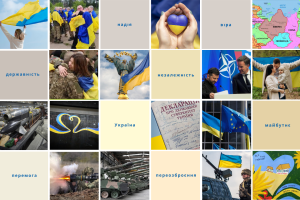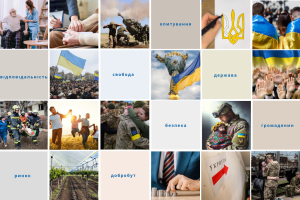Two years of the law on language: successes and failures
Nationwide survey was conducted by Ilko Kucheriv Democratic Initiatives Foundation in collaboration with the Center for Political Sociology during February 16–27, 2021. A total of 2003 respondents were surveyed on the sample representing the adult population of Ukraine (excluding the occupied territories). The sample is representative of such indicators as gender, age, type of settlement, and oblast of residence. The maximum random sampling error does not exceed 2.2%.
For comparison, given is the data of a survey conducted by Democratic Initiatives Foundation in cooperation with Razumkov Centre Sociological Service from August 14 to 19, 2020.
- The majority of Ukrainian citizens in all regions support fundamental principles of state language policy in Ukraine. A survey in August 2020 showed that the majority of respondents in all regions believe that all citizens of Ukraine must know the state language, Ukrainian must be the language of communication of the civil servants and government officials, and the state language must be taught шт all state educational institutions.
- Amid the unfolding and the aggravation of socio-economic and security problems, caused by COVID-19 pandemic, citizens consider that the issue of use of the different languages in Ukraine is not as important as other issues. 5% of citizens consider the use of different languages is one of the most acute problems of the state. Another 28% believe that the language issue is quite serious, but there are also more pressing issues. 27% of Ukrainians do not consider language issues as acute with some exceptions, and for 32% this problem is far-fetched altogether.
- About 16% of citizens say that they or their family members encountered negative attitudes from others because of their native language. Among those who consider Ukrainian their native language, 12% said about the cases of negative attitudes, and among those who consider Russian their native language—20%. It is interesting that among the native Russian speakers who reported cases of negative attitudes, the majority live in the Southern and Eastern regions. This suggests that some of these people have not encountered cases of negative attitudes but appear to be vulnerable to the Russian propaganda messages about suppression of the Russian language in Ukraine.
- The majority of respondents (54%) support the introduction of the compulsory use of the state Ukrainian language in the service sector, but the situation differs in the regional context. In the Southern and Eastern regions, there are more people who do not support this idea, while in both regions, a third of citizens still support this requirement of the law. In the electoral context, many supporters of this decision would vote for the political parties "European Solidarity" (95%) and "Batkivshchyna" (89%). Among voters of th political party "Servant of the People" 62% support such a clause while 34% oppose it. The lion’s share of opponents belong to the voters of the party "Opposition Platform — For Life": 73% of them do not support such decision. People who consider Ukrainian their native language mostly support (66%) this decision, while people whose native language is Russian mostly do not support (22%) the introduction of compulsory use of the state Ukrainian language in the service sector.
TABLES OF RESPONDENTS' ANSWERS DISTRIBUTION
Do you agree with the following statements?
- All citizens of Ukraine must know the state language (August 2020)
| Ukraine in general | West | Center | South | East |
Totally agree | 40,4 | 66,7 | 37,7 | 24,6 | 27,7 |
Rather agree | 38,7 | 25,8 | 45,1 | 46,7 | 37,5 |
Rather do not agree | 11,7 | 3,8 | 11,3 | 15,4 | 17,7 |
Totally disagree | 4,3 | 0,6 | 3,1 | 1,7 | 10,5 |
Hard to say | 4,9 | 3,1 | 2,7 | 11,7 | 6,6 |
- All government officials and civil servants must communicate in the state language during working hours (August 2020)
| Ukraine in general | West | Center | South | East |
Totally agree | 51,1 | 75,2 | 51,5 | 36,5 | 35,4 |
Rather agree | 31,2 | 19,4 | 36,7 | 45,6 | 27,3 |
Rather do not agree | 10,0 | 1,9 | 8,6 | 10,4 | 19,2 |
Totally disagree | 4,0 | 0,4 | 0,8 | 2,5 | 12,4 |
Hard to say | 3,8 | 3,1 | 2,5 | 5,0 | 5,6 |
In all state educational institutions most subjects must be taught in the state language (August 2020)
| Ukraine in general | West | Center | South | East |
Totally agree | 44,7 | 77,1 | 46,0 | 28,2 | 21,1 |
Rather agree | 32,5 | 16,7 | 42,3 | 39,8 | 29,1 |
Rather do not agree | 11,3 | 2,3 | 8,0 | 17,0 | 21,6 |
Totally disagree | 5,6 | 0,8 | 1,3 | 2,5 | 17,7 |
Hard to say | 5,9 | 3,1 | 2,3 | 12,4 | 10,5 |
In your opinion, how important are the Ukrainian language development issues for Ukraine? (August 2020)
| Ukraine in general | West | Center | South | East |
I consider this issue to be a high priority | 19,8 | 42,1 | 20,9 | 5,8 | 4,3 |
This issue is important, but there are more urgent needs | 43,9 | 45,8 | 47,5 | 40,4 | 38,6 |
I consider these issues to be of secondary importance | 32,7 | 9,4 | 27,4 | 46,3 | 55,2 |
Hard to say | 3,6 | 2,7 | 4,2 | 7,5 | 1,9 |
In your opinion, how acute is the use of different languages in Ukraine issue, if you compare it to other ones? (February 2021)
| Ukraine in general | West | Center | South | East |
This is one of the most acute issues in Ukraine | 5.2 | 5,3 | 4,2 | 7,1 | 5,5 |
The language issue is quite serious, but there are also more pressing issues | 27.9 | 28,1 | 27,9 | 28,2 | 27,6 |
In general, the language issue is not acute, except in some cases | 26.7 | 34,6 | 19,4 | 30,1 | 28,5 |
The issue of using different languages is far-fetched altogether | 31.9 | 25,3 | 36,3 | 31,9 | 31,3 |
Hard to say | 8.2 | 6,8 | 12,2 | 2,8 | 7,1 |
Do you or your family members encounter negative attitudes from others because of your native language? (February 2021)
| Ukraine in general | Ukrainian is native | Russian is native |
Yes, I often encounter it | 2,3 | 2,0 | 3,5 |
Yes, sometimes I encounter it | 13,9 | 12,2 | 19,9 |
No, this has never happened | 78,5 | 80,0 | 73,2 |
Hard to say | 5,3 | 5,8 | 3,3 |
Region of residence of respondents who consider Russian as their native language and say they have encountered negative attitudes because of their native language (N = 113):
West | 4,4% |
Center | 23,9% |
South | 27,4% |
East | 44,2% |
Do you support the introduction of the compulsory use of the state Ukrainian language in the service sector? (February 2021)
| Ukraine in general | West | Center | South | East |
Totally support | 26,4 | 46,0 | 28,8 | 8,0 | 14,6 |
Rather support | 27,9 | 34,8 | 28,7 | 29,4 | 18,0 |
Rather do not support | 20,9 | 11,6 | 21,1 | 35,0 | 20,0 |
Do not support it at all | 15,2 | 1,3 | 9,3 | 21,2 | 36,0 |
Hard to say | 9,7 | 6,3 | 12,2 | 6,4 | 11,4 |
| Political party "Batkivshchyna" | Political party "European Solidarity" | Political party "Opposition Platform — 'For Life'" | Political party "Servant of the People" |
Totally / rather support | 66,3% | 87,7% | 22,3% | 62,4% |
Rather / do not support it at all | 22,7% | 7,7% | 72,8% | 34,2% |
Hard to say | 11,0% | 4,5% | 4,9% | 3,4% |
| Ukrainian is native | Russian is native |
Totally / rather support | 65,8 | 22,4 |
Rather / do not support it at all | 24,8 | 69,2 |
Hard to say | 9,4 | 8,5 |
In your opinion, what will be the consequences in your region of the implementation of the Law of Ukraine "On ensuring the functioning of the Ukrainian language as the state language"? (February 2021)
| Ukraine in general | West | Center | South | East |
Rather positive | 27,3 | 40,7 | 35,7 | 9,5 | 11,4 |
Rather negative | 21,4 | 9,5 | 14,7 | 36,5 | 34,6 |
No consequences | 38,4 | 41,8 | 34,7 | 41,4 | 39,0 |
Hard to say | 12,9 | 8,0 | 14,9 | 12,6 | 15,0 |








